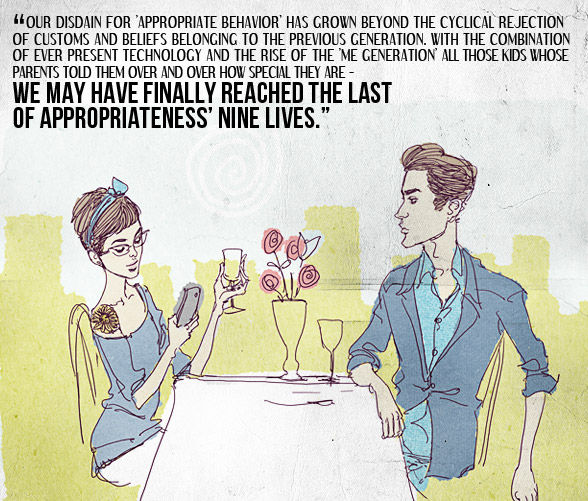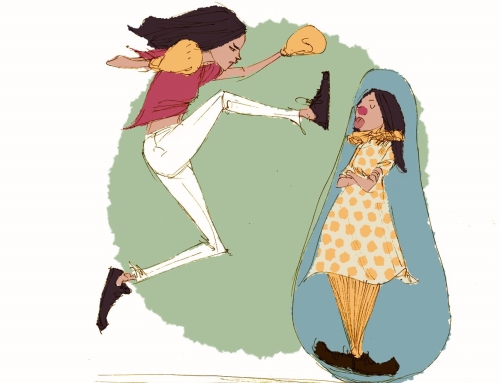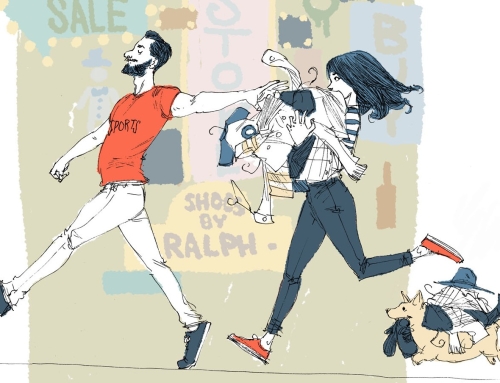There are plenty of ways relationships have changed since the advent of 24/7 technology. Social media mind fucking. The weird and occasionally wonderful world of online dating. The psychedelic rabbit hole known as Craigslist’s “Missed Connections” board. One of the most indelible (and in my opinion damaging) changes in the way that we relate to each other stems from a general culture shift: the death of being appropriate.
Appropriateness is one of those qualities that has always seemed to be part of the establishment. Being appropriate is the first thing to die on the altar of new movements; hippies didn’t care that their parents thought beards and general unkemptness was inappropriate, punks didn’t care that their parents thought studs and spikes were inappropriate, and those of us that came of age in the nineties didn’t care that our parents thought baggy pants and crop tops were inappropriate. It was a mark that you were doing something right if the generation before you believed you weren’t behaving appropriately. There is value in shucking away at the established conventions — it is what allows us to grow culturally. But our disdain for appropriate behavior has grown beyond the cyclical rejection of the fashion of the previous generation. With the combination of ever present technology and the rise of the ‘me generation’ – all those kids whose parents told them over and over how special they are – we may have finally reached the last of appropriateness’ nine lives.
I was raised in an age where behaving appropriately was still very much a thing. While I was encouraged to have my own opinions and identity, and to express them whenever I could, it was also very clear that while being myself was important, being a respectful person, and therefore an appropriate person, was also a goal.
For instance, when I was little, sometimes my mother would take me to the ballet. Now, I say this realizing I might sound a bit like Eloise, but before you make any assumptions, she and my dad took me to a lot of places, including but not limited to community baseball games, union protests, dinner parties and folk music festivals (I grew up in B.C., so make that lots of folk music festivals). When we would go to the ballet though, there were certain sartorial rules: no denim, no t-shirts, no sneakers. I would usually end up in some party dress, with tights and patent shoes. And it would probably feel a little silly while I was at home, but on arrival, it made so much sense why I had to wear those things. I would look around and realize that everyone there had made that effort, and it was out of respect for the occasion, and each other that we had.
I say all of this because I recently went to the ballet again. I wore a grown up version of my childhood going-somewhere-sort-of-fancy outfit, naturally falling into the habit of dressing appropriately for the occasion. When I walked in though, I found myself in the minority. All of the old rules were being broken (there were many jeans, many sneakers, many t-shirts and many straight-from-work office wear ensembles). All of a sudden, the “appropriate” outfit became the over dressed outfit. It made me realize that we are entering an age where being appropriate just doesn’t feel relevant anymore.
How we dress for occasions is just the tip of the iceberg. Technology has made it so simple to be virtually connected that we’ve lost track of being literally connected. Looking at the person you are having a meal with while they are speaking is no longer a given, while having your phone in your hand at the table is. I have seen people who are clearly on a date in the early stages of a relationship, who don’t seem to think anything of texting during their meal, ignoring the person that they are supposed to be trying to get to know. I am guilty of this with as well, and my long time guy is the king of it, known to frequently drop out of a conversation midsentence to respond to an email. While growing up, I was never allowed to get up from the dinner table to answer the phone, and I now think nothing of picking up a call while dining with just about anyone.
Another side effect of technology, specifically cell phones, is that they have taken away the need to stick to a plan. Being appropriate is kissing cousins with being considerate. The fact that being late is now announced by a quick one-line text, and that cancelling plans has become so commonplace that it is no longer assumed you need to call the person and verbally explain yourself, is neither considerate nor appropriate. The funny thing is that it seems we all accept this shift without batting an eye. The problem with inappropriate behavior, like being late for a meeting or cancelling a plan at the last minute, becoming commonplace behavior is that we forget what it was like before, and what the expectations were of all of us. We begin to believe the inappropriate is normal.
How is it possible that we have allowed our cultural norms to be so altered by the technological tools we rely upon? I posit that the shift may be happening in part because of the generation who were raised on the idea that they were “special”. Parenting philosophy has seemed to shift towards the idea that rather than teaching kids to pursue the practical, they should be raised to believe that their individuality made them important. Each child was taught that “being yourself” was the key to success, making it less important to try and fit in — who wants to fit in when you can stand out? Validation for your every idea and lifestyle choice can be found in the form of “likes” on your Facebook status, and retweets of your tweets. Being appropriate doesn’t get you attention, and attention-seeking is now the name of the game.
A good example of this came up on the second season of the HBO show GIRLS, when free-spirited Jessa met her new husband’s parents for the first time. Rather than try to say the kinds of things she knew they wanted to hear, she shared her general disdain for working for a living, her reasons for dropping out of college (heroin addiction) and basically presented herself as a concerned parent’s worst nightmare. While it was played for laughs, this is a common theme in today’s relationships. People don’t see the need to temper their personalities or opinions to win over a particular audience — the expectation seems to have become that no matter the situation, the top goal should always be “being yourself,” convention and appropriateness be damned.
So, after that long Andy Rooney-style rant about kids today, how do I suggest we revive appropriateness? While I think we may never salvage certain things — keeping cellphones away from the dinner table seems to be a lost cause — I do think there is something we can all do to try and save the notion of being appropriate. If we can pull it off, we will all be better for it.
The solution may just be a healthy serving of humble pie. We each have an area that we get to stand out, even to be special. That does not mean that we should stand out in every circumstance. We all deserve respect as we go about our daily lives, and in turn, that respect requires us to approach the rest of the world with the same. Dress nicely for occasions that call for it. Show up places you say you will, at the times you are supposed to be there. Don’t treat every environment like it is your living room, for instance, public transit is a shared space, so yelling on the phone, or eating stinky food is just plain rude. Looking your dinner companion in the eye rather than fiddling with your smartphone can only help your relationships. We simply need to remind ourselves that everything has a time and place for a reason.
I certainly don’t believe we should all be line-towing prudes. I think fresh ideas can and should bust conventions and that each generation has an opportunity to rewrite the rules. If we discard the general rule of appropriateness however, we run the risk of becoming a horde of noisy, disruptive narcissists. Personally, I don’t need to be special — I will take respectful and respected any day of the week.
Published March 29, 2013











